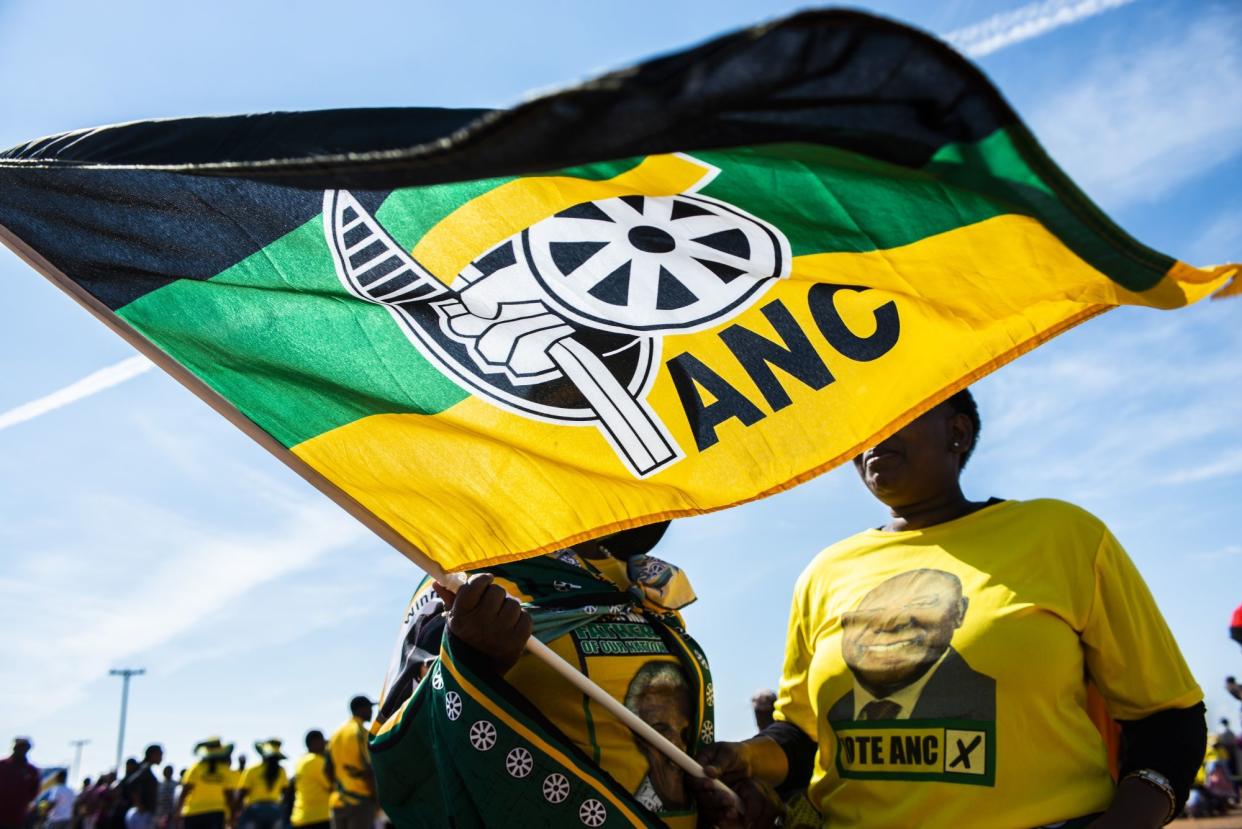What South Africa’s ANC Decided at Its National Conference

- Oops!Something went wrong.Please try again later.
- Oops!Something went wrong.Please try again later.
(Bloomberg) -- South Africa’s governing party concluded a five-yearly gathering Friday to fine-tune its policies and adopt new ones, with electricity shortages, welfare grants, the central bank’s mandate and the management of state companies among the items on its agenda.
Most Read from Bloomberg
Brazil Capital Reels From Anti-Lula Rioters Who Stormed Congress
Ukraine Latest: Zelenskiy Says Extra Troops Will Defend Bakhmut
Several of the policy resolutions adopted by the African National Congress were reiterations of previous decisions the party took years ago but were never executed.
The changes were meant to be debated at the ANC’s Dec. 16-20 national conference where President Cyril Ramaphosa won a second term as party leader, but that meeting was adjourned until this week because proceedings were delayed by registration glitches.
These are some of the key economic decisions it took:
Energy
The ANC recognized that South Africa’s energy supply crisis is the biggest impediment to economic growth. It called for state utility Eskom Holdings SOC Ltd.’s unsustainable debt burden to be urgently restructured to enable it to end power cuts and for the country’s weak transmission system to be strengthened to enable new plants to be connected to the grid. “There should be a renewed focus on demand side management as a short- to medium-term intervention,” the party said. “Given the extent and impact of the crisis we face, the use of emergency provisions should be considered.” It also called for the development of green hydrogen and electric vehicle industries to be prioritized.
Africa’s most industrialized economy was subjected to record outages last year because Eskom, which supplies more than 90% of the nation’s electricity, was unable to keep pace with demand from its old and poorly maintained plants.
Read more: Why Blackouts Are Still Crippling South Africa: QuickTake
State Companies
The ANC resolved that state companies operating in specific economic sectors should be overseen by the relevant government departments. That could potentially signal the dissolution of the Department of Public Enterprises. Eskom would then fall under the Department of Mineral Resources and Energy and logistics company Transnet SOC Ltd. and South African Airways under the Department of Transport.
That could raise concerns among some investors as Gwede Mantashe, the energy minister, has been a critic of plans to transition the economy to green energy even though Ramaphosa advocates doing so.
A comprehensive review of all state-owned entities should be undertaken to determine which of them should be “retained, consolidated or repositioned,” the ANC said. There has been little follow-though on previous suggestions that the government sell non-core assets.
Read more: South Africa’s ANC Suggests State Firm Ownership Model is Dying
Central Bank
The ANC urged the Reserve Bank to “implement monetary policy in a balanced manner, taking into account growth, employment, and exchange rate factors.” Mantashe, who is also the ANC’s chairman, and Mmamoloko Kubayi, the head of the party’s economic transformation committee, both said it had been resolved to broaden the central bank’s mandate to ensure it plays a bigger role in shoring up the economy and promoting employment, but the details still had to be finalized.
The Reserve Bank implements its inflation-targeting mandate in the interest of balanced and sustainable growth and has repeatedly said the obstacles to bolstering output fall outside the scope of monetary policy.
Read more: South Africa Ruling Party Seeks Broader Central Bank Mandate
Welfare Grants
It was agreed that the welfare system “should be protected from inflationary pressures, and should be expanded to provide for basic incomes as fiscal space allows.”
Welfare recipients outnumber personal-income taxpayers and the National Treasury has warned that an indefinite extension of the Social Relief of Distress, or SRD, grant — a temporary stipend seen by many as precursor to a basic income grant — in its current form will threaten the sustainability of the public finances unless a permanent source of funding is found.
Measures be taken to contain state debt and introduction of a wealth tax should be considered to reduce inequality, according to the ANC. It however reiterated that the government should establish a state bank, even though Finance Minister Enoch Godongwana has warned that the country can’t afford to fund it.
Read more: South Africa Buckles on Welfare Grants, Stands Firm on Wages
Land Reform
The ANC urged the government to take full advantage of new expropriation laws to address racially skewed land ownership patterns and accelerate the process of being underutilized farmland into production. A new redistribution bill will be introduced to “facilitate equitable access to land based on the needs of the people of South Africa” and enable the state to acquire agricultural land for distribution to previously disadvantaged groups, it said. The party has abandoned a previous proposal to change the constitution to make it easier for the government to take land without paying for it, after failing to secure the backing of opposition parties.
Read more: Why South Africa Is Stuck in a Land Reform Quagmire: QuickTake
--With assistance from Khuleko Siwele and Antony Sguazzin.
Most Read from Bloomberg Businessweek
It Takes 6,000 Gallons of Water to Cool the World’s Fastest Supercomputer
The Secret to Ron DeSantis’s Success? Ignore Donald Trump—and Attack Business Instead
©2023 Bloomberg L.P.


